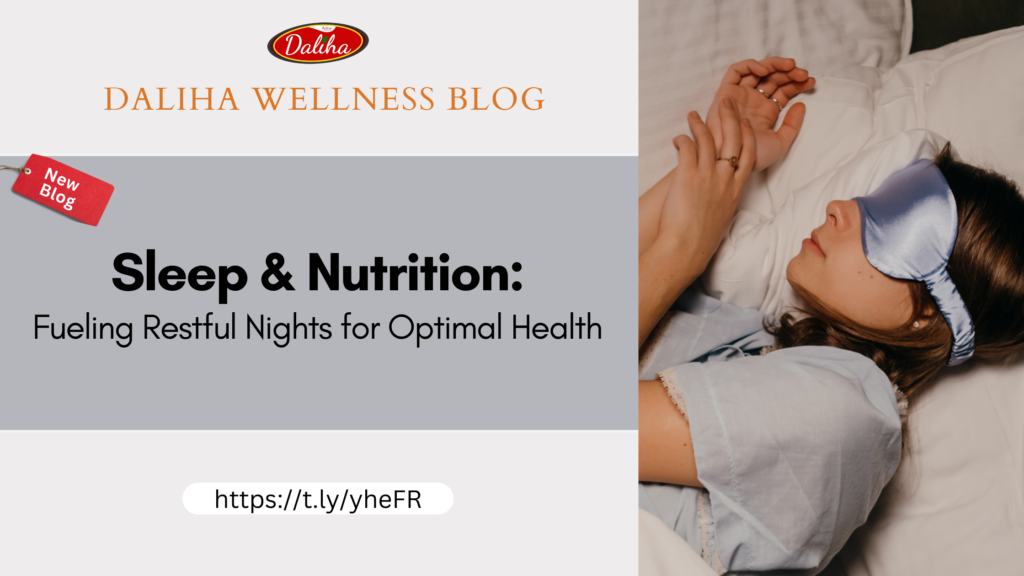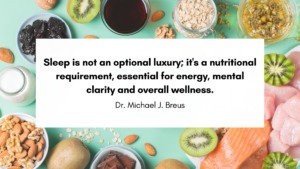When it comes to achieving a good night’s sleep, many of us focus on factors like stress management, creating the ideal sleep environment, or establishing a calming bedtime routine. While these elements certainly play a significant role in restful sleep, there’s another critical piece of the puzzle that’s often overlooked: nutrition.
The connection between what we eat and how well we sleep is profound. Our food choices can influence everything from hormone regulation to energy levels, making the right nutrition a key player in determining the quality and consistency of our sleep.
How Nutrition Impacts Sleep
1. Energy Regulation:
Food is fuel, and the types of foods we consume directly affect our energy levels throughout the day. Certain foods can increase alertness, while others promote relaxation and sleepiness. Carbohydrates, for example, raise blood sugar and can have a calming effect when consumed in moderation, helping to prepare the body for rest.
2. Hormone Regulation:
Our bodies rely on nutrients to produce key hormones involved in sleep. Melatonin, the hormone responsible for sleep-wake cycles, and serotonin, a mood-regulating neurotransmitter, are heavily influenced by our dietary choices. Foods rich in tryptophan, an amino acid, play a significant role in boosting serotonin and melatonin production. Research has shown that tryptophan intake can significantly improve sleep duration and quality .
3. Digestion:
The timing and composition of meals can impact digestion and, in turn, our ability to fall and stay asleep. Heavy, fatty, or spicy foods may cause discomfort, heartburn, or indigestion, all of which can disrupt sleep. Studies have linked late-night eating to poorer sleep quality, as it activates digestion when the body should be resting.
Foods That Promote Better Sleep
To optimize your sleep, it’s important to incorporate foods that support relaxation, hormonal balance, and digestion. Here are some top contenders:
1. Tryptophan-Rich Foods:
Foods like turkey, chicken, fish, eggs, and beans are high in tryptophan, an essential amino acid that boosts the production of serotonin and melatonin, both crucial for restful sleep. Research suggests that tryptophan can also enhance mood, making it a two-fold benefit for relaxation.
2. Complex Carbohydrates:
Whole grains, sweet potatoes, and fruits can help promote a steady release of insulin, which in turn makes tryptophan more available to the brain, encouraging better sleep.
3. Omega-3 Rich Foods:
Fatty fish (such as salmon and mackerel), walnuts, and flaxseeds are excellent sources of omega-3 fatty acids. Studies indicate that these fatty acids reduce inflammation and have been linked to improved sleep duration and reduced insomnia.
4. Calcium-Rich Foods:
Calcium helps the brain use tryptophan to manufacture melatonin. Dairy products, leafy greens, and fortified plant-based milks are excellent sources of calcium that can aid in sleep regulation.
5. Herbal Teas:
Sipping on herbal teas such as Daliha Turkey Berry Mint, chamomile, lavender, or valerian root before bed can help relax the body and mind, thanks to their natural calming properties. Daliha Turkey Berry Teas, in particular, contain antioxidants and iron that bind to certain receptors in the brain, promoting relaxation and sleepiness.
Foods to Avoid Before Bedtime
While some foods can promote sleep, others are notorious for causing disruptions. To maximize your chances of a restful night, it’s best to avoid:
1. Caffeine:
Found in coffee, tea, chocolate, and energy drinks, caffeine stimulates the nervous system and can interfere with falling asleep, even if consumed several hours before bed. Research shows that even consuming caffeine six hours before bedtime can significantly reduce sleep quality. Go for caffeine-free options like Daliha Turkey Berry Mint Tea.
2. Sugar:
Refined sugars in desserts, processed snacks, and sugary beverages can cause blood sugar spikes and crashes, leading to restlessness during the night.
3. Heavy Meals:
Rich, fatty, or spicy foods consumed late in the evening can lead to indigestion, heartburn, or general discomfort, all of which can delay sleep onset and interrupt sleep cycles.
4. Tyramine-Rich Foods:
Tyramine is an amino acid that can stimulate brain activity, keeping you awake. Aged cheeses, wine, and fermented meats are particularly high in tyramine and best avoided in the hours leading up to bedtime.
Nutritional Tips for Better Sleep
Here are some practical ways to adjust your eating habits to foster better sleep:
1. Establish a Bedtime Snack Routine:
If you find yourself feeling hungry before bed, opt for a light snack that includes sleep-promoting foods, such as Daliha Turkey Berry Mint Tea, a small bowl of yogurt with nuts or a banana with almond butter.
2. Stay Hydrated:
Dehydration can lead to restless sleep, so make sure to drink water throughout the day. However, try to limit fluid intake right before bed to avoid middle-of-the-night trips to the bathroom.
3. Avoid Late-Night Meals:
Try to finish eating 2-3 hours before you go to sleep. This allows your body enough time to properly digest the food and prevents discomfort during the night.
4. Experiment with Sleep-Promoting Supplements:
If you struggle with sleep despite following these guidelines, consider talking to a healthcare professional about natural sleep aids like magnesium, melatonin, or valerian root supplements. Magnesium, for instance, has been shown to improve sleep quality by promoting muscle relaxation and reducing stress.
Conclusion
By making mindful food choices—eating sleep-promoting foods and avoiding those that interfere with rest—you can significantly improve your sleep quality. With better sleep, you’ll not only wake up refreshed but also experience enhanced productivity, improved mood, and long-term health benefits like a stronger immune system and reduced risk of chronic diseases.
Ready to take your sleep to the next level? Start incorporating these sleep-friendly foods into your daily meals and experience the difference. Let us know which tips worked best for you in the comments!
Connect for more…
Join our wellness service for comprehensive health management tailored to help you achieve your wellness goals holistically.
Stay updated with our latest nutrition and wellness articles on our blog by subscribing to our mailing list or joining our Wellness Hub. For any inquiries, reach out to us via email at info.daliha@gmail.com or via call/WhatsApp on +1 (703) 843-4003 or +233 20 134 1203.






